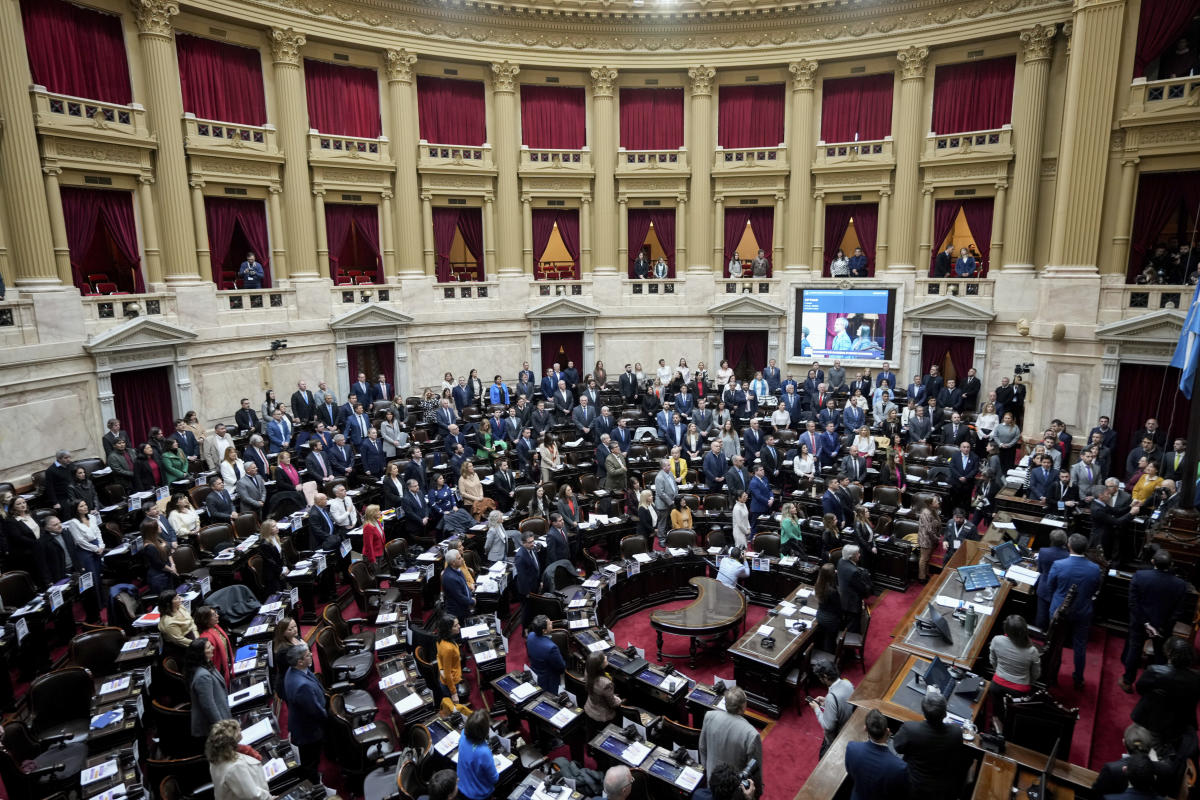BUENOS AIRES, Argentina (AP) — Argentina’s lower house of parliament approved President Javier Milei’s sweeping economic reform bills on Friday. In doing so, the libertarian leader won a much-needed legislative victory after six months of fierce fighting and vociferous protests that raised questions about his ability to govern.
Milei’s landmark legislation, which aims to bolster his plan for a “zero budget deficit” and attract foreign investment, was finally passed by the lower house on Friday and became law.
The passage — which was widely expected after the bills slipped through the Senate earlier this month despite fierce political opposition — strengthens the president’s standing at home and abroad as economic pressure mounts. Milei came to power promising to pull Argentina out of a dire economic crisis that has deepened poverty and driven annual inflation to nearly 300%.
Milei’s government hailed the law’s passage as putting Argentina “on the path to the free and prosperous country that Argentines chose” in last November’s elections. The government blamed the turbulent process on “obstruction” by Milei’s hardline opponents.
Milei’s party controls less than 15 percent of congressional seats and has so far relied on executive powers to slash government spending and impose the president’s radical vision of a small state. Analysts have said only congressional approval could give Milei the support he needs to boost investor confidence in Argentina, a country with a long history of defaults and contract breaches.
“This is a big win for Javier Milei,” said Bruno Gennari, Argentina specialist at KNG Securities, adding that the vote had already given bonds a boost. “He had to make substantial concessions to get his first bill through Congress, but the reforms it brings to Argentina are still far-reaching.”
The bill for a constitutional reform with more than 230 articles passed through the friendlier lower house without any problems. The lower house of Congress, known in Argentina as the Chamber of Deputies, had already approved the content of the legislation in April and sent the bills to the Senate for further debate, which ended with a hard-fought vote.
This time, the Chamber of Deputies voted for or against the amendments tabled by the senators during their meeting of June 13.
Lawmakers approved the changes early Friday and much of the 12 hours of heated debate focused on an income tax on another 1 million workers and a wealth tax championed by cash-strapped provincial governors.
The legislative package includes major incentives for foreign companies investing more than $200 million in Argentina, a plan to privatize some state-owned companies and a controversial expansion of presidential powers over economic policy.
Much of the criticism of the bill focuses on the incentive scheme. According to the government, this arrangement is crucial to the ultimate goal of lifting capital controls. However, skeptics say the scheme goes too far in favoring foreign companies with lucrative tax breaks and other benefits.
Deregulation measures in labor laws that allow employers to fire workers for participating in protests have also been passed, despite fierce opposition from the country’s powerful unions, who rallied outside Congress on Thursday, shouting and beating drums against Milei.
While the law marks a significant shift from the budgetary economic model of the country’s left-wing Peronist movement, it is significantly watered down from Milei’s original proposal, which had more than 600 articles.
For example, Milei went to work planning the privatization of more than three dozen state-owned companies, including big names like the flagship company Aerolíneas Argentinas, the national bank and the state oil company. Ultimately, he managed to get approval for the sale of just six lesser-known public companies, such as the sanitation supplier in Buenos Aires.
Milei, who has characterized himself as a “mole” who wants to destroy the state from within and has derided lawmakers as “rats,” has faced obstacles in winning over political allies.
In recent weeks, he fired his inexperienced chief of staff and handed over negotiations with the opposition to Interior Minister Guillermo Francos, a slick political player with close ties to several political parties.
Milei indicated that he would use his momentum to reach further agreements, announcing that he would invite governors and other powerful politicians to gather on Argentina’s Independence Day, July 9, to sign a grand national pact committing to carrying out his reforms.
Still, analysts say the vote, after months of Congressional paralysis, underscores how polarizing Milei’s agenda remains.
“Milei can get a bill through Congress, but it took him a long time,” said Lucas Romero of the political consulting firm Synopsis. “The time it took shows the legislative weakness with which he governs.”
__
Associated Press writer Isabel DeBre in Buenos Aires contributed to this report
